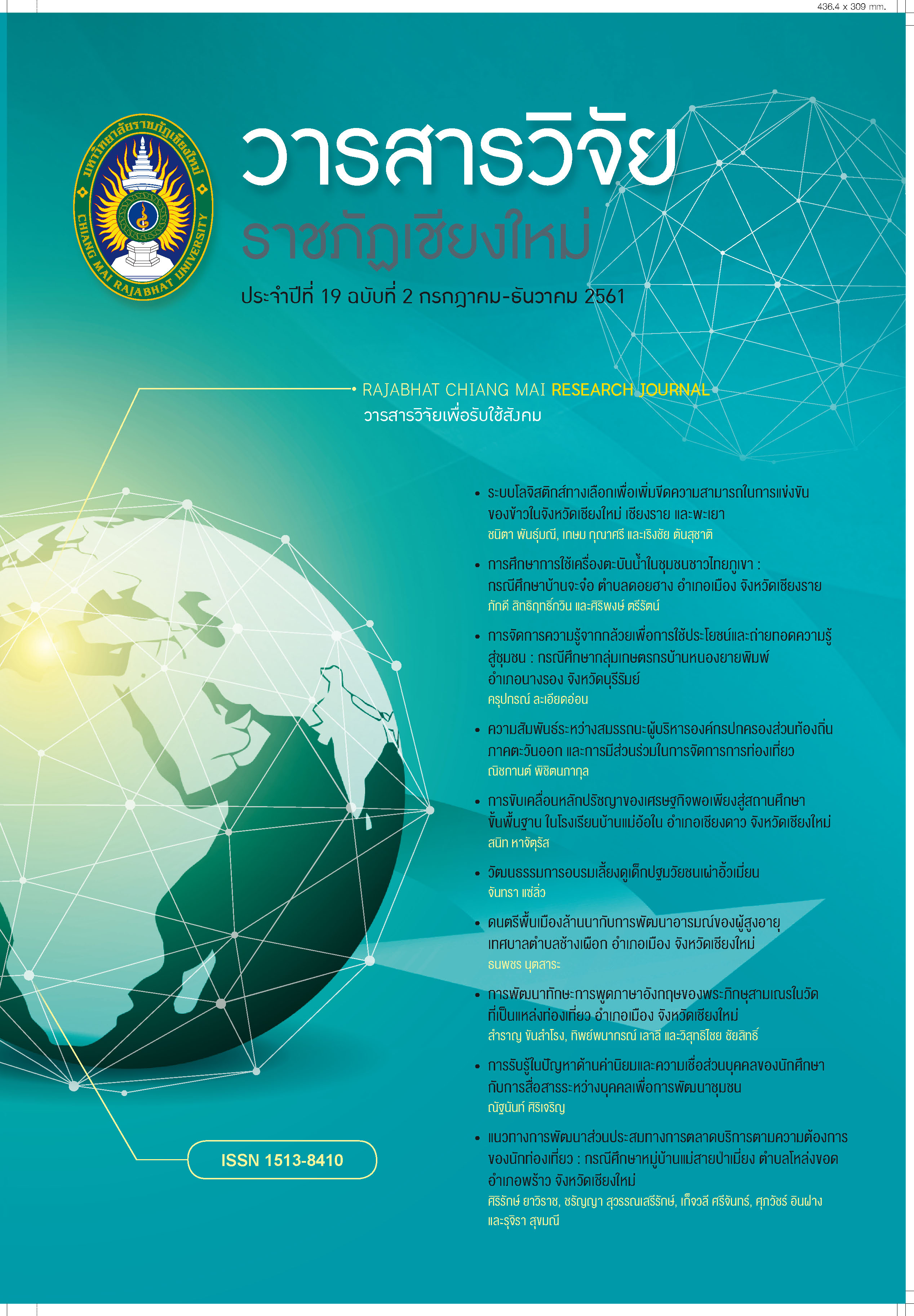Iu Mien Tribe Child Rearing Culture
DOI:
https://doi.org/10.14456/rcmrj.2018.151805Keywords:
วัฒนธรรม, การอบรมเลี้ยงดู, เด็กปฐมวัย, ชนเผ่าอิ้วเมี่ยนAbstract
This research aims to study the culture of early childhood education of the Iu Mien ethnic group. A total of 65 samples were selected from the sample group consisting of 20 Iu Mien mentors and 45 early childhood parents. The tools used in the study were in-depth interviews, informal interviews, participatory observation and non-participant observation. This research was a Qualitative research using descriptive analysis.
The result showed that the Iu Mien have changed in economic terms, society and physical structure are quite modern. This affects the preparation of family planning, ie, marriage and childbearing when it comes to health and the economy. Unlike the past, they would have the child immediately after marriage and young. In the life and early childhood education of the Iu Mien are associated with culture, traditions, rituals and beliefs that have long been inherited.
Iu Mien parents will be raising children together without separate duties. Use democratic parenting and abandonment schemes in some families. Bring knowledge from various sources for example from the teachings of the elders, from the advice of the doctor, in the book, etc. in parenting and promoting development coupled with parenting based on culture, traditions, rituals and beliefs inherited from the ancestors to encourage children to grow, develop well and be able to support their families when they grow.
Downloads
References
เครือข่ายวัฒนธรรมอิ้วเมี่ยน. (2545). สาระองค์ความรู้ภูมิปัญญาท้องถิ่นอิ้วเมี่ยน (เย้า). องค์กรชุมชนบ้านปางค่า - ปางพริก. พะเยา : สำนักงานกองทุนเพื่อสังคม.
ชลาธิป สมาหิโต. (2549). การพัฒนาภาษาสำหรับเด็กปฐมวัย. กรุงเทพมหานคร: สาขาวิชาการศึกษาปฐมวัย ภาควิชาการศึกษา คณะศึกษาศาสตร์ มหาวิทยาลัยเกษตรศาสตร์.
ธันวา จิตต์สงวน และคณะ. (2551). คู่มือส่งเสริมพัฒนาการเด็กด้วยการเล่านิทาน อ่านหนังสือ และการเล่นกับลูก. กรมพัฒนาสังคมและสวัสดิการ กระทรวงพัฒนาสังคมและความมั่นคงของมนุษย์ : กรุงเทพมหานคร.
มาลินี จำเนียร. (2537). การเปลี่ยนแปลงวัฒนธรรม ความเชื่อและพฤติกรรมของมารดาหลังคลอด. วิทยานิพนธ์ปริญญาพยาบาลศาสตรมหาบัณฑิต สาขาสังคมศาสตร์การแพทย์และสาธารณสุข, มหาวิทยาลัยมหิดล.
วรรณวิมล วิเชียรฉาย. (2549). ศึกษาปัจจัยที่มีอิทธิพลต่อความตั้งใจในการเลี้ยงลูกด้วยนมแม่อย่างเดียวนาน 6 เดือนหลังคลอดของหญิงตั้งครรภ์ที่มาฝากครรภ์โรงพยาบาลพระปกเกล้า. วิทยาลัยพยาบาลพระปกเล้า สาขาการพยาบาลครอบครัว: จันทบุรี.
ศูนย์ประสานงานพัฒนาการศึกษาบนพื้นที่สูง. (2536). ชาวเขาในประทศไทย. กรุงเทพมหานคร: กระทรวงศึกษาธิการ.
สายฝน แสนใจพรม. (2559). การวิจัยเชิงปฏิบัติการแบบมีส่วนร่วมเพื่อการพัฒนาสื่องการจัดการเรียนรู้ โดยบูรณาการภูมิปัญญาท้องถิ่นที่สอดคล้องกับวิถีชีวิตในชุมชน. วารสารวิจัยราชภัฏเชียงใหม่, 17(2), 101-110.
อานันท์ กาญจนพันธ์. (2544). วิธีคิดเชิงซ้อนในการวิจัยชุมชน : พลวัตและศักยภาพของชุมชนในการพัฒนา. กรุงเทพมหานคร: สำนักงานกองทุนสนับสนุนการวิจัย.
อำภาพร พัววิไล. (2546). ค่านิยม ความเชื่อ เรื่องการอบรมเลี้ยงดูเด็กในขวบปีแรก. การศึกษาเชิงคุณภาพ.
กรุงเทพมหานคร : โครงการวิจัยระยะยาวในเด็กไทย.
Downloads
Published
How to Cite
Issue
Section
License
1. Articles, information, content, images, etc published in the “Community and Social Development Journal” are copyrighted by the Community and Social Development Journal, Chiang Mai Rajabhat University. In order to properly distribute the articles through print and electronic media, the authors still hold the copyright for the published articles under the Creative Commons Attribution (CC BY) license, which allows the re-distribution of the articles in other sources. References must be made to the articles in the journal. The authors are responsible for requesting permission to reproduce copyrighted content from other sources.
2. The content of the articles appearing in the journal is the direct responsibility of the article authors. The editorial board of the journal does not necessarily agree with or share any responsibility.














